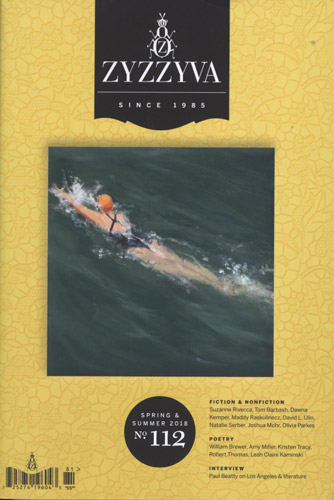ZYZZYVA – Spring & Summer 2018
Founded in 1985, ZYZZYVA pulled its title from the very back of the Oxford English Dictionary, embracing the proud South American weevil and transforming it into a rather distinguished mascot. Run by Editor Laura Cogan and Managing Editor Oscar Villalon, ZYZZYVA makes near-annual appearances in the Best American series and The Pushcart Prize. Issue 13 introduced American readers to Haruki Murakami with “The Kangaroo Communiqué,” a typically bizarre and humorous story about a merchandise control manager in the midst of a nervous breakdown. Other distinguished contributors have included Amy Hempel, Adrienne Rich, Raymond Carver, and Ursula K. Le Guin. ZYZZYVA still accepts submissions exclusively by snail mail and requests a self-addressed stamped envelope for reply, but is otherwise easygoing, setting no page limits, themes, or limits on submissions—though they do ask submitters to wait until they’ve heard a response before submitting additional work.
Founded in 1985, ZYZZYVA pulled its title from the very back of the Oxford English Dictionary, embracing the proud South American weevil and transforming it into a rather distinguished mascot. Run by Editor Laura Cogan and Managing Editor Oscar Villalon, ZYZZYVA makes near-annual appearances in the Best American series and The Pushcart Prize. Issue 13 introduced American readers to Haruki Murakami with “The Kangaroo Communiqué,” a typically bizarre and humorous story about a merchandise control manager in the midst of a nervous breakdown. Other distinguished contributors have included Amy Hempel, Adrienne Rich, Raymond Carver, and Ursula K. Le Guin. ZYZZYVA still accepts submissions exclusively by snail mail and requests a self-addressed stamped envelope for reply, but is otherwise easygoing, setting no page limits, themes, or limits on submissions—though they do ask submitters to wait until they’ve heard a response before submitting additional work.
Issue 112 is as solid as one might expect, featuring work by twenty contributors in the normal categories of fiction, nonfiction, poetry, and artwork. Eileen David’s oil paintings—one of which graces the cover—are stocked with ocean-side architecture and swimmers in caps. Though well reproduced in color, they don’t exactly scream off the page. They are, in fact, the sort of neutral, cautious fare common to the established American literary journal. Many of the issue’s early pieces evoke this same feeling, a sort of subdued confidence—good enough, well-crafted, but not terribly memorable.
The shift happens with Oscar Villalon’s interview of Paul Beatty, which combines conversations from 2015 and 2017 that center around creative methodology, cultural observation, and Beatty’s long history with Los Angeles. In 2016, Beatty became the first American to win the Man Booker Prize, for his novel The Sellout. The conversation between Beatty and Villalon alternates between serious, deep subjects and bursts of humor. At one point, Beatty declares, “I know Oscar too well for [doing an interview].” Later, when Villalon pursues the grand intent of the novel, Beatty replies, “It’s not like I realized my intentions while I was writing the book, but because I’ve been talking so much about The Sellout, I’ve been able to make up some fake intentions.” The serious moments of the interview touch on myriad issues, including the idea of “unmitigated blackness,” the unexpected neighborhoods of L.A., and the need to depart from America’s New York-centric view of literature. For fans of Beatty and the uninitiated both, the interview is well worth its readers’ time, offering both insight and entertainment.
Michael Zaken’s protagonist falls into a lucid dream in “Defects”—the author’s first publication—leaving his comfy couch in Jerusalem to shadow a young boy in the West Bank whose family has ties to Hamas, but who himself strives for an education in science that eventually propels him to the Hebrew University of Jerusalem. There he is monitored by agents of Shin Bet—the Israeli intelligence agency—one of whom becomes paternally inclined toward the boy, now a young man, and later becomes obsessed with discovering his internal motives, all the while failing to conceive a child with his supportive wife. “The garbage can fills,” Zaken writes, “with negative pregnancy tests that glow a radioactive green and cast a reticulated orb of light that extends to the end of the couple’s moonlit bedroom where they try for a baby without success.” In the midst of the careening story made remarkable by Zaken’s mouthwatering prose, it’s easy to forget that this is merely a dream, soon to be interrupted by child’s toy, leaving the reader desiring more.
Devon Walker-Figueroa begins her poem “My Madness Is My Love Toward Mankind” with a stunner of a line, writing, “People are mistakes and I / do not want to commit any.” Walker-Figueroa’s contribution is pitch-perfection: odd, funny, irreverent, and willing to face what comes. “I shout Death! and stand / on my head so the public understands me,” she writes, setting the stage for Suzanne Rivecca’s nonfiction piece “Ugly and Bitter and Strong,” which details the author’s desire to hang herself in an often-empty San Francisco mini-park. Like Walker-Figueroa, Rivecca handles heavy and light, quickly bonding the reader to her story, to the tragedy and the laughter, dark humor and genuine fear. She describes balancing her primary job at a homeless-youth program with a freelance gig writing copy for a celebrity’s luxury makeup brand. Yet, Rivecca writes, “When I wasn’t writing makeup copy or human services grants, all I did was shake and panic and weep and walk the streets, barreling up and down hills with the blinkered imperviousness of a phantom passing through walls.” Though difficult and encouraging and funny and heartbreaking, the essay’s best moment comes in the form of Rivecca’s bio, which reads, in part, “She lives in San Francisco.”
For these writers and more, pick up the latest issue of ZYZZYVA, offering readers solid writing and art.
[www.zyzzyva.org]





